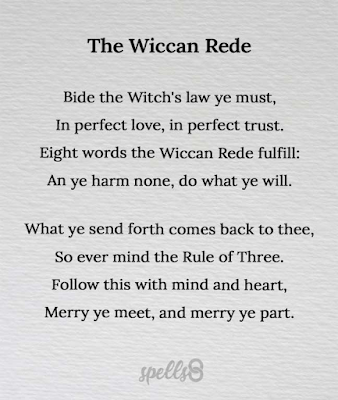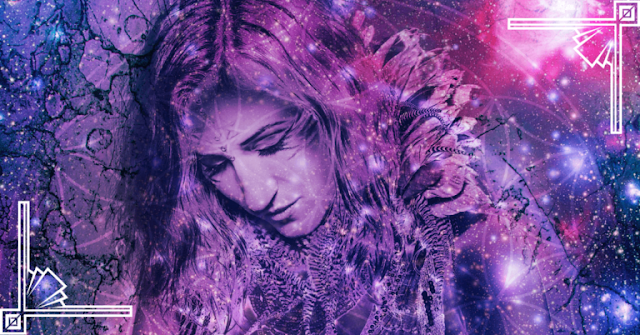Describe Wicca. A Witches' Religion, then?
Two primary deities are observed in the Neo-Pagan religion of Wicca: a God and a Goddess. The Wiccan Rede, which is a code of conduct that forbids Wiccans from harming others, and care for the land are this religion's basic tenets. Being a relatively decentralized religion, Wicca encourages its adherents to create their own rituals, practices, and beliefs.
Differences Between Wicca, Witchcraft and Paganism
More than Wicca, there are other other varieties of Paganism. However, Wicca is a terrific place for many people to start.
Wicca 101
The Wiccan Rede
Advice is the translation of the term "rede," which is pronounced "reed." It is more of a word of advice than a command or a prohibition.
Despite this, there are numerous potential meanings and no single interpretation that is true. The Wiccan Rede encourages us to practice and take responsibility for our actions while constantly keeping in mind that there are only practitioners in Wicca, not believers. If exercising your will has no unfavorable effects, go ahead and do it.
XEM THÊM :
Cách chơi mậu binh từ cơ bản đến nâng cao dành cho người mới
What is the Wiccan Rede?
Only eight words make up the Wiccan Rede: "An ye harm none, do what ye will." It's comparable to the "Golden Rule" and is regarded by Wiccans as a sort of code of conduct (the principle of treating others as you want to be treated). The idea that you can do whatever you choose as long as you don't hurt anyone is one that practically all religions share, including Wicca.
Who wrote the Wiccan Rede?
The Wiccan Rede was originally made public in a 1964 lecture by Doreen Valiente, where it was initially documented in its most well-known form as the "eight words" couplet.
Because there are so many variations of the Wiccan Rede, it is unclear who actually composed it. Some claim Lady Gwenny Thompson (who received it from Adriana Porter) while others conflate her with Doreen Brave's "The Creed of the Witches."
What does the Wiccan Rede teach?
The significance of the Rede is a topic of discussion among the Neopagan and Wiccan groups. The argument centers on the idea that the Wiccan Rede is a piece of advise rather than a mandate and that it does not address activities that can be harmful.
We should not concentrate on the word "harm," but rather pay attention to our will, according to Thea Sabin, who writes about this in her book Wicca for Beginners: Fundamentals of Philosophy & Practice. The Wiccan Rede encourages us to practice and act responsibly while reminding us that there are only practitioners in Wicca who have found that the True Will is Love.
Wiccan Beliefs
In its earliest forms, the Wiccan religion was a practice that predates both the Christian and even the Roman eras.
- The foundation of the Wiccan religion is the Earth and all the energy it contains. Earth, air, fire, and water are the four universal elements that are typically involved; however, others concur that a fifth element called Spirit exists (or Akasha).
- The God and the Goddess are two of the Deity's facets.
- Both feminine and masculine qualities can be found in nature. Because each is necessary for preserving the harmony of existence, the two characteristics are of equal importance.
- Spirits and gods may go by several names, but they all refer to the same deity, thus it doesn't matter what name they are given.
- Wicca can be practiced both alone and in a coven. A coven is a gathering of people who engage in rituals, celebrations, knowledge sharing, and other activities.
- Since nature is the best temple and the most auspicious location for rites and gatherings, Wiccans do not need to construct temples.
- Within Wicca, various traditions exist. Since diversity is a quality that characterizes people, all traditions are accepted on an equal basis. Everyone is free to practice their own form of worship or to combine rituals and beliefs from several traditions.
- Eclectic Wiccans are those who practice without adhering to any certain tradition. They absorb knowledge from several systems and adhere to whichever functions the best for them.
Wiccan Celebrations
The word "Sabbath" refers to Wiccan festivals. These celebrations symbolize the merger of God and Goddess, a myth that highlights the divine unity of the two energies that govern all of nature's forces. The Sabbats are eight.
- Many pagans celebrate Samhain as their new year. It differs from Halloween in many ways.
- The winter solstice is at Yule.
- Between the winter solstice and the spring equinox, Imbolc occurs.
- It is spring equinox on Ostara.
- The start of summer is signaled by Beltane.
- The longest sunshiny period is during Litha.
- The first of the three Wiccan harvest celebrations is Lughnasadh, often known as Lammas.
- Mabon marks the equinox of fall.
Wiccan Spells
Rituals are used frequently by Wiccans to bring about the changes they desire in their life. Utilizing magic entails interacting with natural forces to bring about that alteration. A magic spell comprises of precise actions taken to achieve a specified result. It occurs in a sacred setting, at a precise time, and with the aid of particular tools that enable us to connect with our objective and disclose the way to it.
Rituals can be as straightforward as making positive declarations or affirmations that guide us toward our goals on a mental, emotional, and spiritual level.
A Wiccan Chant with Green Candle to Get your Dream Job
‘Fire Flowers’: A Wiccan Spell to Open Roads to Love
‘Moon Boon Chant’: Wiccan Magic to Attract Money
“Achieving wisdom, understanding and equilibrium with what surrounds us is our mission. We believe that Faith is born of personal experience, not written words. That we are one with the Universe, that the Spirit is in and around us. That is our path.” – Scott Cunningham














Comments
Post a Comment